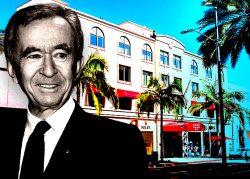LVMH is a hotel brand often reserved for those who can afford a $2,000 handbag or $300 bottles of cognac. Now, the future of its developement on Rodeo Drive is set to be decided by voters.
Labor union Unite Here Local 11 has garnered enough signatures to put two referenda on the ballot in Beverly Hills that would ask voters to overturn the City Council’s approval of the 109-key Cheval Blanc hotel and the development agreement for the project.
In September, the City Council approved the project and passed a development deal two months later. The hotel, set to rise at 468 Rodeo Drive, is expected to be a revenue windfall for the city, generating at least $725 million.
L.A. County is currently reviewing the signatures, a process that is set to be completed by Feb. 2, after which the council will meet, according to a spokesperson for the city of Beverly Hills. Under California law, the union had to obtain signatures from 10 percent of all registered city voters — about 2,100 people.
If all the signatures are certified, the referenda will trigger an election, delaying the project further. Also, the City Council can rescind both the development agreement and the approval.
At the Nov. 1 meeting where the council approved the project, a representative for Unite Here Local 11 voiced opposition to the project, saying more needed to be set aside for affordable housing for workers.
Last month, Beverly Hills Mayor Lili Bosse called signing the petitions “a devastating mistake” and continued to advocate for the project, according to a column published in the Beverly Hills Courier.
“This petition is not resident driven, it is union driven,” she wrote, adding petitioners could remove their signatures if they were having second thoughts.
The only council member to oppose the project was John Mirisch, who argued the city should have charged LVMH more for the project.
“Don’t be concerned about LVMH’s finances,” he said at the November meeting. “They’re doing quite well.”
LVMH is familiar with hurdles on the project. During the planning process, luxury retailers including Hermès, Giorgio Armani and Chanel had concerns that construction of the hotel would disrupt their own operations and block a shared alley for VIP clients.
Read more



